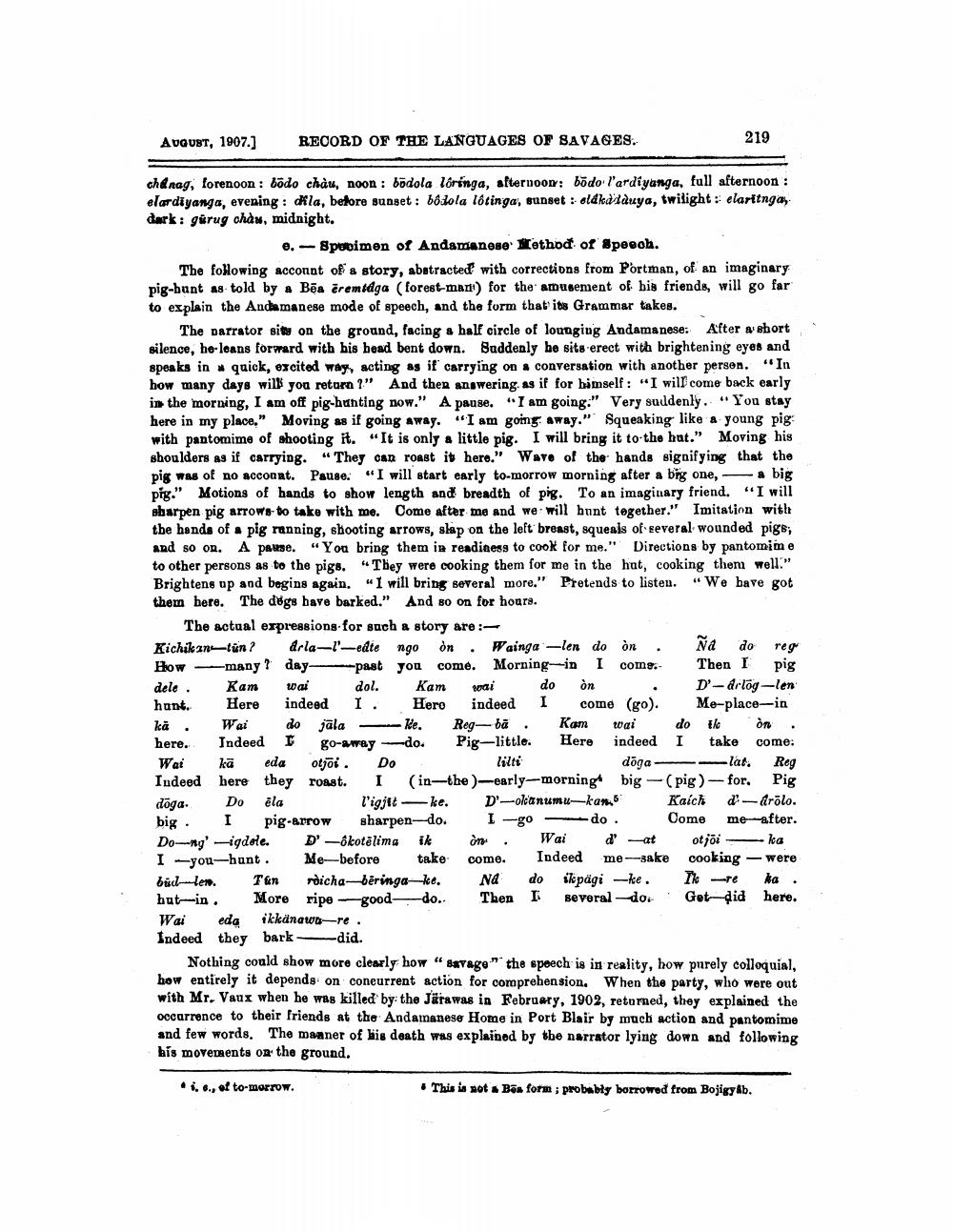________________
AVQUST, 1907.)
RECORD OF THE LANGUAGES OF SAVAGES.
219
che nag, forenoon : bodo chàu, noon : bõdola lórínga, afternoon: bõdo l'ardiyanga, full afternoon : elardiyanga, evening : la, before sunset: bétola lotinga, sunset: olákálduya, twilight: claritnga, dark : gürug chàs, midnight.
0.- Sperimen of Andamanese Method of Speech. The following acconnt of a story, abstracted with corrections from Portman, of an imaginary pig-bant as told by a Bēs ēremidga (forest-man) for the amusement of his friends, will go far to explain the Andamanese mode of speech, and the form that its Grammar takes.
The Darrator sits on the ground, facing a half circle of lounging Andamanese: After a short silence, he-loans forward with his bead bent down. Baddenly be sits erect with brightening eyes and speaks in * quick, excited way, acting as if carrying on a conversation with another persen. "In how many days will you retora ?." And then answering as if for himself: "I will come back early in the morning, I am off pig-hunting now." A pause. "I am going:" Very suddenly. "You stay here in my place," Moving as if going away. "I am going away." Squeaking like a young pig with pantomime of shooting it. It is only a little pig. I will bring it to the hat." Moving his shoulders as if carrying. "They can roast it here." Wave of the hands signifying that the pig was of no account. Pause. "I will start early to-morrow morning after a big one, - a big pig." Motions of hands to show length and breadth of pig. To an imaginary friend. "I will sharpen pig arrow-to take with me. Come after me and we will hunt together." Imitation with the hands of pig ranning, shooting arrows, slap on the left breast, squeals of several wounded pigs; and so on. A pause. "You bring them in readiaess to cook for me." Directions by pantomime to other persons as to the pigs. "They were cooking them for me in the hut, cooking them well." Brightens up and begins again. "I will bring several more." Pretends to listen. "We bave got them here. The dogs have barked." And so on for hours.
The actual expressions for such a story are : Kichik an---lün? drla-'-edtengo on . Wainga - len do òn .
Na do rege How many ? day- past you come. Morning-in I come. Then I pig dele. Kamw ai dol. Kam sai do ôn . D'-Arlög-len hant. Here indeed 1. Here indeed I come (go). Me-place-in ka. Wai do jāla ke. Reg-ba. Kam tai do tle on . here. Indeed go-away -do. Pig-little. Here indeed I take come: Wai kā eda otjoi . DO
dõga
l at. Reg Indeed here they roast. I (in-the-early-morning big pig) --for. Pig döga. Doela
l'igjtt - ke. D-olcanumu-kam 5 Kaich d arõlo. big. I pig-arrow sharpen-do. I-go do. Come meafter. Do-ng' igdole. D'-kotēlima ik on Wai d -at o tjoi - ka I -you-hunt. Me-before take come. Indeed me--ake cooking - were büchlen. Ten richa-bēringa—ke. Na do skpägi -ke. Ik - Ha. hut-in. More ripe good do. Then I several-do. Get did here. Wai eda ikkinawa-re. Indeed they bark did.
Nothing could show more clearly how "Savage" the speech is in reality, how purely colloquial, how entirely it depends on coneurrent action for comprehension. When the party, who wore out with Mr. Vaux when he was killed by the Jerawas in February, 1902, returned, they explained the occurrence to their friends at the Andamanese Home in Port Blair by much action and pantomime and few words. The maaner of his death was explained by the narrator lying down and following his movements on the ground.
• *.., of tomorrow.
• This is not Bas form; probably borrowed from Bojigyb.




